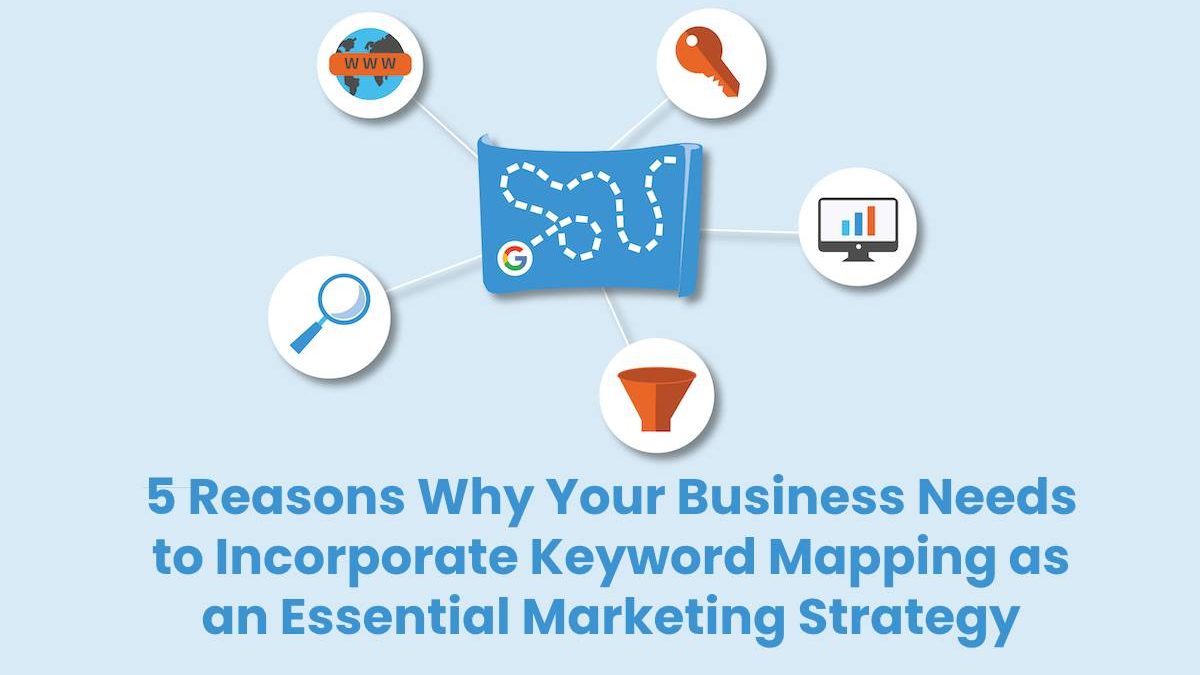Keyword Mapping
Marketing today is evolving at a significant pace compared to just 10 years ago. Before the use of social media, blogs and online content, marketing was very much based on adverts, billboards, radio and posters. However, thanks to the advancement in technology today, marketing has become wide and diverse, creating an array of marketing opportunities from social media, to website banners and YouTube adverts.
Marketing in today’s world is as important as creating a product or service that consumers would be interested in. The stakes have grown higher in marketing, making it the department in businesses that, in many cases, requires the most financial support.
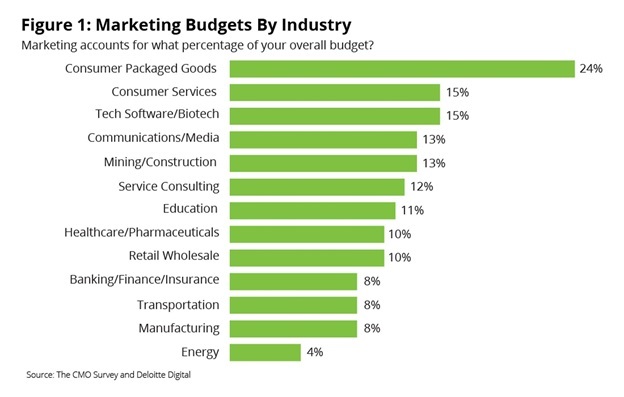
Achieving business goals is largely down to how well all parts of a business works together. In most cases, SEO-aware companies will want to rank in the top ten of Google’s SERPs.
For this to be possible, businesses not only need to ensure their product or services are popular enough to be discovered, but they also need to consider the content on their site.
This is where keyword mapping comes into play and is important as it helps get the right pages from a website to show up on Google’s search feed for searches that are related to it.
Table of Contents
What is keyword mapping?
Keyword mapping involves the use of keyword research and understanding what the right keywords for your site and page are.
Assigning relevant keywords to the different pages on your site through the keyword research will help it rank higher on Google.
It’s a big part of on-page search engine optimization that will help search engines sieve through all the pages of your site and pull up the most relevant one based on the user’s search.
When creating content for a site, it’s important to consider SEO. If, for example, the content on a site isn’t created with keyword research and mapping, there’s a chance it will go unnoticed as the search engine may not understand how the content connects with what the user has searched.
For this reason, keyword mapping is a big park of working towards a business goal. This is a new way of getting in front of customers compared to more traditional advertising approaches.
Mapping out the keywords that directly link to your businesses in your content will allow the search engine to pick up its relevance and help rank it higher.
Keyword mapping can be done in a few ways as there is a variety of software, such as Semrush and SimilarWeb out there that can help.
Some tools are also capable of providing content strategy insights that help determine the relevancy and show an estimated search volume showing insight metrics of how difficult it would be to rank content for a desired keyword.
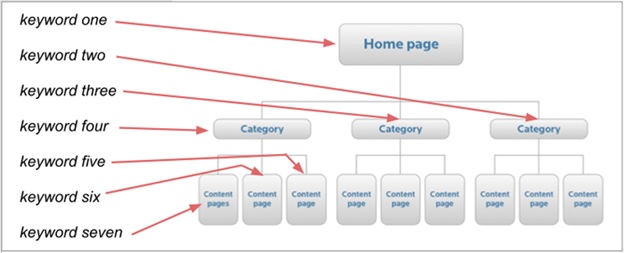
The more traditional way of doing keyword research and keyword mapping, which also may be more time consuming, is to create a spreadsheet document and put each of your pages in a row on the sheet.
Make a list of possible keywords using a keyword tool and monitor monthly what the search volume and racking difficulty has been for the words.
The process of mapping takes time and motoring and so it is important to be able to have all this information in one place as you will need to refer back to it and monitor your findings.
Why is keyword mapping important?
Keyword mapping is vital because it helps to set the tone for all the content on your site and your digital marketing strategy.
Keyword mapping is ultimately the backbone of any digital marketing strategy as it enables search engines like Google to find your site and its relevant content amongst the millions of other pages across the web.
Keyword mapping also helps to give your content marketing a clear and concise direction that aligns with your business and target audiences needs and interests.
The insight from keyword research will equip any business with the knowledge and understanding of what consumers are researching for which helps to make content more relevant – making it a more valuable and useful resource.
Keyword maps can also give you a good insight into the position of your business in a constantly changing market. With this in mind, it’s a good idea to do keyword research and mapping often.
Developing and taking time to perform mapping sets up a digital campaign for success, allowing them to plan for the future, explore goals and possibilities and develop a plan of action helping to connect with consumers at the right time in the right place with the right message.
5 reasons why you need keyword mapping
Keyword mapping is regarded as essential by many marketers in terms of accomplishing online business goals.
Let’s take a deeper look into five key reasons why this approach is so important to incorporate into business models:
Help to set data driven goals
An essential part of digital marketing consists of setting business goals and outcomes. Keyword mapping can help to give businesses a clear direction to help build strategies to meet goals.
Creating these benchmarks can help ensure most digital marketing efforts align with overall company goals.
Keyword mapping can help businesses to implement a strong digital content strategy with the knowledge and insight required to make it relevant creating data driven goals.
What must always be remembered is that, even if all digital strategies may not be the same, they all work hand in hand to create the overall outcome of a digital strategy and need work in unison with one another.
Conversion funnel strategies
Conversion funnel strategies are primarily used to help turn a prospect into a paying customer.
Keyword mapping can help convert customers because a business needs to first identify how a customer is converted and then apply their knowledge from the keyword research and mapping into the content on their pages.
Emotive language can also help to push consumers through the sales funnels until they have purchased a product or service.
Creating a conversion funnel audit now and then can help a business to change their strategies and keep on top of consumer trends.
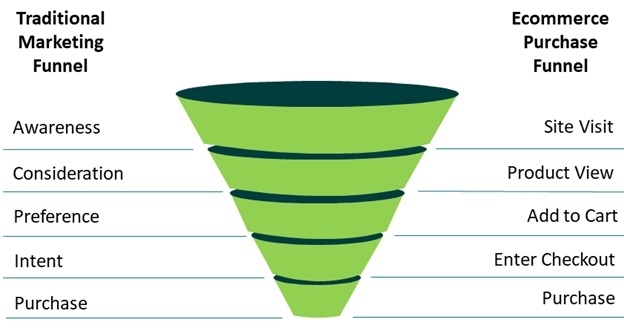
Caring for the architecture of your business
Websites need to have clear structures and architecture for them to be successful. Most typically start with navigational menus that take users to other pages.
This enables users to go into categories and various subcategories until users finally get to the products.
When a website is laid out structurally it’s easy to use this structure to aid keyword mapping.
Once the architecture of the site is set up, keyword mapping can begin and keywords can be assigned to specific pages.
This will help search engines like Google to understand the architecture and target each page porley as it should to be relevant to the search request.
Better chances of ranking
If website pages are loosely targeted to audiences with various ambiguous words it will be impossible for them to rank.
Keywords have the most authority of any words on a web page and so they play an instrumental role.
Target words make the process of digital marketing more useful, and can suggest to Google that the content created on a specific site is well crafted and is the same or similar to what the user is looking for.
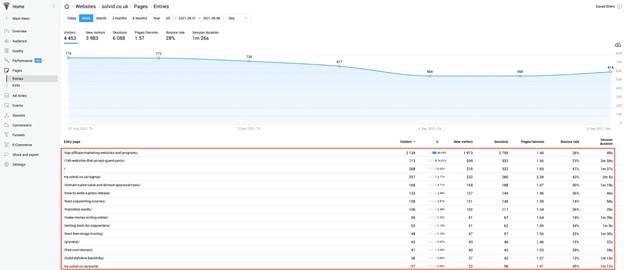
Analytical platforms like Google Analytics and Finteza can help marketers to observe the success of their selected keywords in terms of the page sessions and traffic they leverage.
This helps to boost your chances of ranking further by monitoring what’s working for you, and what needs more work.
Clear URLs
Clear architecture of your site with the use of keyword mapping helps to make URLs clearer and also, as pages from your site are likely to rank higher there may be a greater chance of users clicking on the links in the content – particularly if a keyword is used as an anchor text for a link.
This means URL structures can also incorporate breadcrumb trails, which are a series of links typically at the top of the page which shows the trail of how you got to your current page.
Fundamentally, keyword mapping can be one of the most effective ways of optimizing your marketing strategies without having to spend significant sums of money in the process.
With a little elbow grease and an attention to detail, you can win new conversions without having to break the bank in the process.

